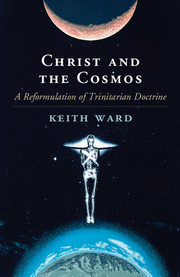Book contents
- Frontmatter
- Contents
- Preface
- Acknowledgements
- PART I THE THREEFOLD NATURE OF THE DIVINE BEING
- PART II THE BIBLICAL SOURCES OF TRINITARIAN THOUGHT
- 6 Three Centres of Consciousness?
- 7 The Synoptic Gospels
- 8 John's Gospel
- 9 The Trinity in the Epistles
- 10 The Idea of Incarnation
- PART III THE TRINITY, IMMANENT AND ECONOMIC
- PART IV THE SOCIAL TRINITY
- PART V THE COSMIC TRINITY
- Bibliography
- Subject Index
- Name Index
10 - The Idea of Incarnation
from PART II - THE BIBLICAL SOURCES OF TRINITARIAN THOUGHT
Published online by Cambridge University Press: 05 September 2015
- Frontmatter
- Contents
- Preface
- Acknowledgements
- PART I THE THREEFOLD NATURE OF THE DIVINE BEING
- PART II THE BIBLICAL SOURCES OF TRINITARIAN THOUGHT
- 6 Three Centres of Consciousness?
- 7 The Synoptic Gospels
- 8 John's Gospel
- 9 The Trinity in the Epistles
- 10 The Idea of Incarnation
- PART III THE TRINITY, IMMANENT AND ECONOMIC
- PART IV THE SOCIAL TRINITY
- PART V THE COSMIC TRINITY
- Bibliography
- Subject Index
- Name Index
Summary
Jesus is presented in the Gospels as a man who is uniquely close to – so close as to be in some sense identical with – God. So we might ask, how close can a human be to God? Jacob Neusner tells of how in ancient Judaism outstanding rabbis were sometimes said to be ‘embodiments of Torah’. They lived in such obedience to the law of God that they seemed to embody it in themselves. It does seem possible for a person to have such an intimate knowledge of God that they could be said to share in the knowledge of God (obviously in a way and to a degree possible for human minds). It is possible for them to have such love for God that they might feel no separation between themselves and God but rather a unity of heart and mind; many mystics speak in such a way. And it is possible for them to be so completely obedient to God that they could be said to become channels of divine action, justice, and compassion in the world. So there could exist a human being who shares in the knowledge of God, is united in love to God, and is a channel of God's love for the world. It is possible that it is God's intended destiny for every human being that they should be in such an intimate relationship with God, and perhaps that is what Paradise is.
Some might feel that this still falls short of that actual identity with God or with the Word of God that is characteristic of the Christian faith of the Church fathers. Was Jesus not the very Word of God incarnate? It is true that this is a ‘Christology from below’ and lies in a modern tradition influenced by theologians such as Donald Baillie, sometimes called ‘Spirit Christology’. Yet the Council of Chalcedon clearly stated that Jesus was ‘truly man’, and the fathers came to affirm that Jesus had a truly human will and was not just God in the outward form of a human person. They also typically asserted that the exact form of identity between the human will and the divine Word was unique and wrapped in ineffable mystery.
- Type
- Chapter
- Information
- Christ and the CosmosA Reformulation of Trinitarian Doctrine, pp. 73 - 82Publisher: Cambridge University PressPrint publication year: 2015



